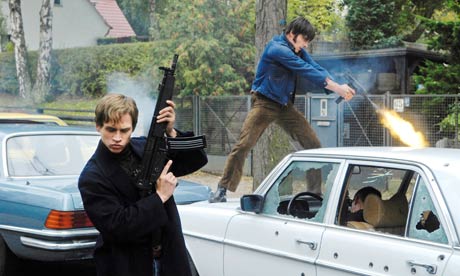
In the current, seemingly intractable phase of political terrorism, it behoves us to look back on and learn from similar waves of violent protest. Joseph Conrad's classic works of psychological and moral insight, Under Western Eyes and The Secret Agent, for instance, help us understand the terrorists of the late 19th and early 20th century, and Uli Edel's The Baader Meinhof Complex brings back the terrible events in the Germany of the 1960s and 1970s in a manner that clears and focuses the mind. The movie is written and produced by Bernd Eichinger, who grew up in those years and most recently wrote and produced Downfall, the thoughtful account of Hitler's last days in 1945 Berlin. His main source is the highly regarded book by the investigative reporter Stefan Aust, who from his student days knew many of the people involved in the terrorist organisation known as the Red Army Faction or RAF.
The movie begins in 1967 with Ulrike Meinhof (Martina Gedeck), a leading writer for the influential radical monthly Konkret, for which she's written an open letter to Empress Farah Dibah on the occasion of her visit with the Shah to West Germany. The Iranian couple's arrival leads to thugs attacking peaceful protesters, first without any police intervention and then with the cops' active assistance. Ending with a protester shot dead by a plainclothesman, it's one of the most brutal scenes of its kind ever filmed, and is the prelude to a story of escalating violence.
After this pivotal incident Meinhof leaves her unfaithful husband and takes her children to a newly independent life. At the same time Gudrun Ensslin (Johanna Wokalek) argues with her father, a Lutheran pastor, liberal but intolerant of social disorder, and moves out to join radical associates. Simultaneously, the dangerously charismatic, possibly psychopathic Andreas Baader (Moritz Bleibtreu) is making bombs to be placed at night in department stores to expose obsessive consumerism and the blind eye being turned towards poverty in the developing world. All three are to come together as they move steadily, though not necessarily inexorably, from humane protest to inhuman terrorism.
The careers of Gudrun Ensslin and Ulrike Meinhof inspired one of the finest German pictures of the post-war years, Margarethe von Trotta's The German Sisters (1981), about the lives of the daughters of a stern Protestant minister from the 1950s to the late 1970s. One becomes a tough feminist journalist, weary of extremism, the other, initially dedicated to public service with Albert Schweitzer, abandons her husband and child to train as a terrorist in the Middle East and ends up with the RAF, committing suicide in jail. Anyone seeing The Baader Meinhof Complex should look out for von Trotta's subtle film, but they'll find it a very different experience. The Edel-Eichinger picture is an objective, detached chronicle that takes us through the events of a decade, showing what the terrorists were reacting against, and the brutal, uncomprehending way the authorities responded. The RAF and their sympathisers identified a neo-Nazi tendency in West Germany that gave support to American imperialism in the developing world, the suppression of Palestinians in Israel and the exploitation of the poor everywhere. Fuelled by utopian ideas, impatient with compromise and gradualism, they expressed their impotent fury in calculated acts of violence against real and symbolic targets. In a self-fulfilling prophesy they pushed Germany towards becoming a police state.
What makes this such a powerful movie is the factual nature of the exposition and the refusal to make easy judgment. It even risks a scene that invites us to experience the excitement of what it's like to be an urban guerrilla released from all social responsibility: Baader, accompanied by a juvenile deliquent who's joined the gang, drives along an autobahn at night in a stolen car, firing guns at road signs as rock'n'roll music plays loudly on the car radio. We're carried along year by year with newsreel footage filling in the global context and brilliant recreations of prison life, the attempted assassination of student leader Rudi Dutschke and various RAF hold-ups. The climax comes in 1977, those fatal 12 months of skyjackings, kidnappings, murders and suicides. It came after a travesty of a trial in which the defendants expressed their contempt for the judicial process and the judges failed to engage them in debate. It could only have happened in an open, democratic society. In an authoritarian state they'd have been tried in private and shot.
The picture is not without humour. There's a hilarious moment at a terrorist camp in Jordan when the visiting Germans tell their Palestinian comrades that sexual liberation and social revolution go together. And there's a very funny scene in which Baader pushes a radical chic lawyer into showing his contempt for bourgeois morality by stealing a purse from a woman in a café in Rome. Immediately afterwards the gang's car is stolen and Baader rails against the Italian thief.
The film does, however, have a hero, Horst Herold, the real-life chief of the Federal German police, a more refined and sympathetic version of Inspector Heat, the London policeman in Conrad's The Secret Agent. Herold (superbly played by Bruno Ganz, who impersonated Hitler in Downfall) uses his professional skills to destroy the gang, and his role ends in effect when they're arrested. It's Herold who appreciates that terrorism can be combated only by understanding the minds of the terrorists and their numerous sympathisers, appreciating the nature of their discontent and seeing how society can change to defuse their anger and frustration.
Incidentally, Oliver Stone ended his George Bush biopic by playing Bob Dylan's 'With God on Our Side' over the final credits. Edel and Eichinger conclude their picture with 'Blowing in the Wind'. Does Dylan have the last word on everything?

